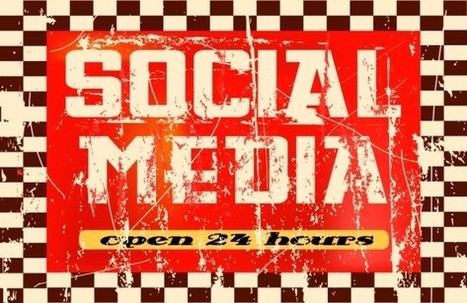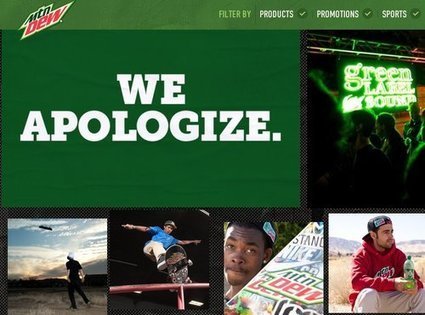 Your new post is loading...
 Your new post is loading...
IAn instant is all it takes to threaten your business's sterling reputation online. You might have had an off day or the misfortune of dealing with an ornery customer, but it's almost inevitable that you'll come face to face with a negative online review at some point in your career. But, as Adrienne Weissman, CMO at G2 Crowd, recently pointed out, negative reviews aren't all bad. Some 70% of Americans read reviews before making a purchase, and those who seek out negative reviews tend to be more engaged and are 67% more likely to make a purchase. Plus, 68% of people trust a company more when their reviews are a mix of good and bad. Of course, the key to making the best of a bad review lies largely in your response. That means you need to be able to find reviews (both good and bad) as they pop up. That's definitely more social media monitoring than one person can handle... And that's where reputation management tools come in. The following five reputation management tools are some of the best on the market for tracking mentions, discovering influencers, and managing online reviews as they happen....
Every publicist feels a combination of schadenfreude and cold-sweat relief upon reading about a crisis involving someone else’s client. And is it me, or does it seem that entertainment publicists have an extra helping of these opportunities? Whether it’s due to naughty personal behavior or corporate shenanigans, we all get our chance at crisis management at some point. This little multiple-choice quiz based on hypothetical scenarios (some of which may or may not bear a resemblance to real-life episodes) can help us all keep our skills sharp.
...Edward Burkhardt, CEO of Montreal, Maine & Atlantic Railways waited 5 days before visiting the crash site andmaking a statement to the media. His statement lacks a significant, quotable apology to those affected, while focusing too much on the technical aspects of dealing with insurance, finances and monetary issues. He even begins his statement by defending whether he is a compassionate person.
True, the CEO does not always need to be the spokesperson in every crisis. However, a crisis this big demands an appearance and statement within 24 hours of the onset of the crisis.
True, I believe a CEO should spend more time managing the crisis and running the company than trying to be a spokesperson, but a crisis this big demands at least a few hours to talk with the media and the families who have lost loved ones. News reports indicate that at the time of the news briefing, the CEO had not reached out to families....
Abercrombie & Fitch’s two-hour meeting this week with critics of its no-large-sizes strategy, and of CEO Mike Jeffries’ 2006 remarks that it only courts “attractive, cool” kids, prompted a mea culpa from the chain, and a vow to “take concrete steps to demonstrate our commitment to anti-bullying in addition to our ongoing support of diversity and inclusion,” the teen retailer said in a statement.
During the meeting, 18-year old activist Benjamin O’Keefe — whose Change.org petition urged A&F to carry larger sizes – Lyne Grefe, the CEO of the National Eating Disorder Association, among others, urged Abercrombie executives to add bigger clothes to store shelves, feature larger models in their branding efforts, cease hawking hyper sexualized advertising to its teen audience and redefine its warped, harmful notions of cool, O’Keefe told Forbes.com. Although the CEO was not at the meeting, the retailer offered a tacit apology for Jeffries’ remarks seven years ago, which included this gem: “A lot of people don’t belong [in our clothes] and they can’t belong. Are we exclusionary? Absolutely.”...
While social media can build your business brand, it can also tear you down. View this list of 10 potentially damaging social media problems. Small business social media is a good thing…usually. Of course, this week observers in business and technology fields got a good look at how social media can also go bad. Challenges in small business social media are inevitable. Social media tools can build your brand. But, they can also tear you down. There are many uncertainties too. Below are 10 troubles with small business social media and how to set them right..--
Poland Spring, American Airlines, Taco Bell and NASCAR all make our list. The year is less than three months old, yet already several brands have made king-sized screwups in social media. Among their crimes: Using a four-letter word to insult a nine-year-old girl. Live-tweeting a mass layoff. And angering Dave Mustaine of Megadeth. Poland Spring, American Airlines, Taco Bell and NASCAR are among the brands who should have known better. All of the following social media fails triggered hundreds or thousands of responses, and made headlines in the regular media as a result....
Tesco salad allegedly contained dead bird; company unresponsive so far This is one of those shocking stories about food product problems that tabloid TV and newspapers love. Before UK retailer Tesco could respond effectively, the story’s going viral. Forget the UK horsemeat scandal. The Metro News headline said it all: “Dead bird five inches long found in Tesco ‘ready to eat’ salad.” Within minutes, the story was picked up on numerous UK media websites, competing newspapers and social media....
|
In September 2015 the Environmental Protection Agency found that many Volkswagen cars sold in the United States were equipped with software that could falsely improve the performance of diesel engines on emissions tests. This cheating was subsequently acknowledged by the car maker.Among the many issues at stake for the company was one of public perception. Anecdotal evidencate at the time of the incident suggested irreparable harm to the Volkswagen brand. So could Volkswagen recover in the short term in this regard? And, the broader question, how can you measure brand perception in times of scandal, particularly in an era where social media can cause negative news to proliferate and reverberate over time? In the absence of direct empirical evidence, we wanted to find a way to tackle this important issue. We began our research with some key questions: How does social media sentiment change as a consequence of a public relations crisis? How does the public react to recovery efforts initiated by the company? How do topics of conversation shift as a consequence of a brand scandal and subsequent recovery efforts?...
“Many studies have already shown how important crisis management is for organizations,” Hong said. “This study shows that Facebook can be a valuable tool for public relations professionals when working to solve or lessen the severity of a crisis. Because Facebook is very personal for its users, well-thought-out crisis management messages can be effective at reaching users on a personal level, which is a powerful way to persuade people to a cause.”
Hong also found that Facebook posts written in a narrative style were more effective than posts written in a non-narrative format. Narrative style is chronological and focuses more on story-telling rather than fact listing.
“This indicates that the effect of narrative tone in organizational statements during crises increases perceived conversational human voice, which represents a high level of engagement and best communicates trust, satisfaction, and commitment to the audience,” Hong said. “This is an important practice for public relations professionals because perceptions that an organization is sincerely trying to provide timely and accurate information during a crisis can lead to not only more favorable attitudes toward the organization, but also perceptions of less responsibility the organization has for causing the crisis.”...
Happy, Friday. This week's Friday PR Picks and social media missives are loaded with crisis management, content marketing and communication insight.
We're featuring 9 valuable crisis management, 10 public relations posts and 14 must-read social media articles. Perfect for the long weekend.
Mountain Dew might have thought twice about the risk and reward from a deal with someone just as focused on branding as it is. ...The company even earned some good press for buying a promoted tweet to publicize its mea culpa. And the top of its website leads with a giant “We Apologize” note. Following these comments, PepsiCo hasn’t put an executive on a public chopping block, and Tyler has declared they loved the idea when it pitched it. Which begs the question of how sincere this apology is. Audiences will probably trust artists more than brands, so PepsiCo cutting their losses must also include a loss of credibility with Tyler’s base....
We say sorry tens of times a day. ‘Sorry’ for bumping into someone in the street when it’s not our fault, ‘sorry, I didn’t quite catch that’ when you simply can’t hear; and of course we apologise for a perfectly legitimate complaint, ‘I’m sorry, but my soup is cold’. Perhaps our unique British politeness is to blame, but is the word sorry uttered so many times a day that it’s beginning to lose all meaning? I’d go as far to say that we don’t’ even realise when we’re saying sorry, or when we’re being apologised to. So for businesses caught in the midst of a PR disaster, how can they make their customers hear their apologies? Firstly, as Stephanie recently blogged, timing is everything; it took Apple two long weeks to apologise for the Apple Maps debacle and they’re still mopping up the bad PR around that one. We’ve seen many corporate apologies in the past few weeks, particularly in the wake of the horse-meat scandal, and some in particular have stuck out. Tesco, though not the only guilty party by any stretch, has been a serial apologist throughout horsemeat-gate. It has taken out full-page ads in every national newspaper, more than once, to say sorry to customers. There is something striking in this age of digital, rapid, instant, direct-to-the-consumer communication, that the full-page print newspaper apology is still so popular with big businesses; and looking more closely at what Tesco said is very interesting. An article on the BBC last week about the style of Tesco’s newspaper ads, suggested that they have more in common with poems than standard corporate apologies....
As the horsemeat saga rumbles on, it is becoming clearer and clearer which organisations invested in crisis management training beforehand…and which didn’t. This manifests itself most obviously in the performance of company spokesperson in their television and radio interviews. I was asked by The Grocer to assess the crisis communication efforts of the big supermarkets and as part of this I analysed the approach of their crisis spokespeople....
|



 Your new post is loading...
Your new post is loading...





















Good reputation management tools if you have a budget, though several offer freemium versions